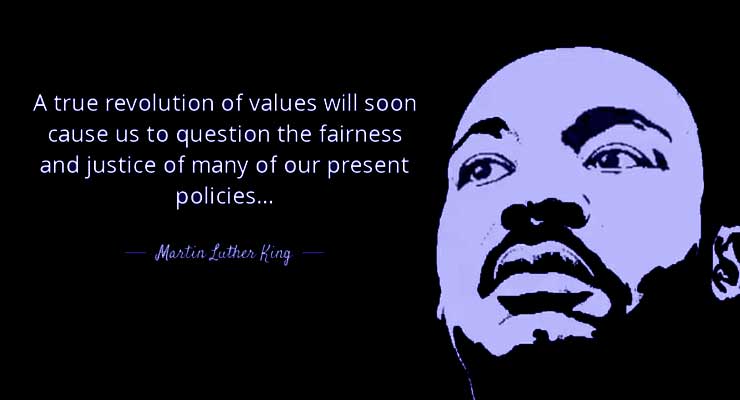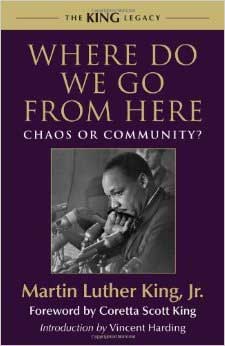
Fifth in a series of ten posts on MLK.
“Our only hope today lies in our ability to recapture the revolutionary spirit and go out into a sometimes hostile world declaring eternal opposition to poverty, racism and militarism.”[1]
King was perhaps the last American leader that could calmly and openly discuss revolution in a way that was convincing to millions of Americans and millions more around the world.
 How did he do that? What was the meaning of the revolution King proposed?
How did he do that? What was the meaning of the revolution King proposed?
King envisioned a revolution of values — of spirit and soul — but also a freedom revolution that would destroy the institutionalized structures of oppression. This revolution took shape in current social movements but was also deeply rooted in the American past. King embraced the revolution in revolutionary strategy: nonviolent force could now replace violence because it was morally and strategically superior. His revolutionary vision took aim at economic exploitation and empire because those power structures stunted every other struggle and were the most intractable obstacles to creating a better world.
Non-violence led King to discover that the revolution was in the minds of the people. He wrote,
“As long as the mind is enslaved the body can never be free.”[2]
Hearts and minds became the King’s battlefield and so he advocated a revolution of values that would create a “people-oriented” rather than a “thing-oriented” world.[3]
[I]n order to get on the right side of the world revolution, we as a nation must undergo a radical revolution of values….When machines and computers, profit motives and property rights are considered more important than people, the giant triplets of racism, materialism, and militarism are incapable of being conquered.”[4]
King assumed that changes in consciousness, in values, in culture were the real revolution and the most important kind of political change. This view has the decisive strategic advantage of making the struggle for social transformation possible here and now — not in some imaginary future when a “revolutionary situation” occurs or when “objective conditions” permits.
Since King made the people — our ideas, participation, activism, consciousness, and courage — the primary strategic consideration, he found that all the raw materials and resources necessary for revolution already exist. Even if unrealized and unfulfilled.
“Our challenge,” King said, “is to organize the power we already have in our midst.”[5]
Word. If there ever was one.
LINKS:
[1] Where Do We Go From Here?, 623
[2] Where Do We Go From Here?, 582
[3] Where Do We Go From Here?, 623
[4] A Time to Break Silence, 240
[5] A Testament of Hope, 319
Leave a Reply